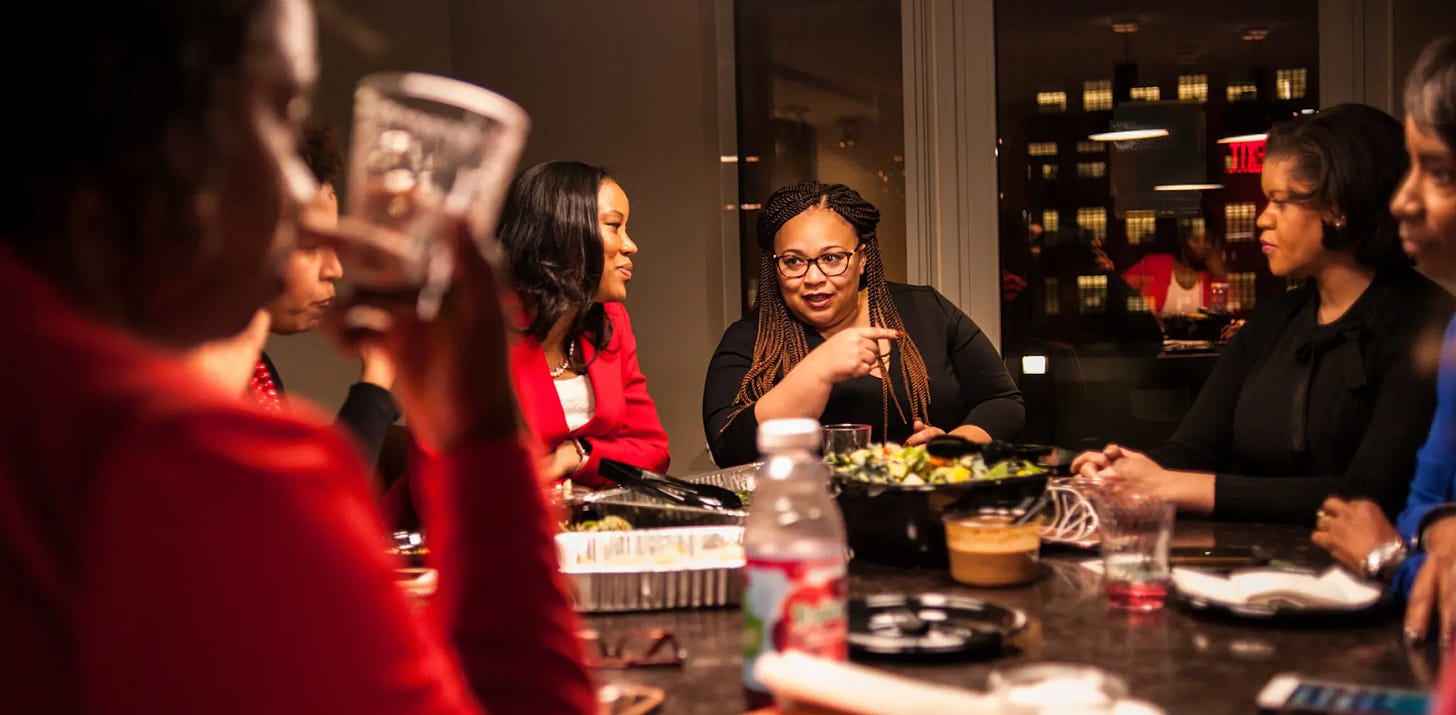The women of the Olori Network, photo credit Kholood Eid for The New York Times
Around the turn of this century, I worked with a lot of beta-stage women’s networks. Whether formal or informal, their primary purpose often seemed to be giving women a safe place to talk. While having a venue in which to air complaints did instill a sense of belonging among participants, it often exacerbated feelings of powerlessness. In addition, support in these early networks was often defined as simply listening, empathizing, and offering emotional backing, rather than taking specific actions to help one another move ahead.
This shifted as these internal groups began adapting some of the practices of traditional Old Boys Networks, putting the focus on mutual advancement but without the elitist bias. Establishing mentoring circles, matching members with sponsors, sharing connections, and focusing on leadership skills helped transform many Employee Resource Groups into healthy and highly effective networks. Their positive impact has been amplified as those who’ve benefited from participation have moved into senior positions, fired with a determination to “pay it forward” to those coming up.
Of course, internal networks are not always powerhouses. In some cases, they may be too formal because of their officially sanctioned nature, whereas classic Old Boy Networks were always highly informal. (Formality and structure can limit the role of personal chemistry, which is key to successful mentoring and sponsorship.) Or these internal groups may remain stuck in defining support as listening and sympathizing rather than as providing advocacy and shared connections.
When this happens, external networks can fill the void.
A superb example is the Olori Sisterhood, a highly effective network of Black female political operatives in Brooklyn, which I was excited to read about in the New York Times a few years ago. These women—fund-raisers, lobbyists, staffers, and public relations specialists—are passionate about politics but prefer to exercise behind-the-scene influence rather than run for office themselves.
This Sisterhood dates back to 2009, when a group of Black male political operatives, many of them close colleagues of the women, organized a strategy meeting in the state legislature from which women were pointedly excluded. In response, some of the women decided to hold their own meeting, which the men promptly tried to crash. That broke up their meeting, but the women decided to continue getting together, in coffee shops or one another’s homes.
At the time, many of the women felt both unseen and stuck. Despite working like demons and being showered with praise for their efforts, their advice was often ignored and they struggled for influence. Most of the promotions in their field went to men whose well-established Old Boy Networks—white, Black, Latino, or mixed—gave them a strong advantage in the tight-knit world of political advisers. While the women had connections, they seemed unable to leverage them in a way that gave them a real boost.
From the start, the Sisterhood served as both grapevine and network in that the women spent time sharing professional horror stories and helping one another emotionally through various life crises, including challenging pregnancies, painful divorces, and the complexities of caring for aged parents. But their commitment from the start was to begin to build their individual and collective power. To that end, they adopted OBN practices.
For example:
• When one of them got an audience with a high-profile political player or was interviewed by a media outlet, she talked up her sisters’ skills.
• When one of them secured a new job, she fought to hire other Olori members.
• When one of them secured a valuable contact, she shared it with the group instead of jealously guarding it.
• When one of them had a high-stakes meeting coming up, the group convened a strategy session to help her.
Through it all, they relentlessly hammered on the message that their network was not just about them and their careers. It was about becoming a resource for helping Black women claim a seat at the table and become recognized as an unstoppable political force.
After more than a decade of fierce mutual advocacy and shared mutual gains, the women moved from local campaign work to heading important lobbying firms and serving as sought-after political consultants for national candidates, which enabled them to have an impact on a bigger stage. When they spoke, aspiring candidates listened. When they faced criticism, someone spoke up on their behalf.
And their male colleagues stopped excluding them from meetings.




